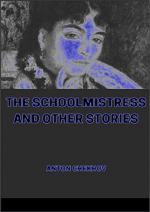It was dark and cold in the garden. Rain was falling. A damp cutting wind was racing about the garden, howling and giving the trees no rest. The banker strained his eyes, but could see neither the earth nor the white statues, nor the lodge, nor the trees. Going to the spot where the lodge stood, he twice called the watchman. No answer followed. Evidently the watchman had sought shelter from the weather, and was now asleep somewhere either in the kitchen or in the greenhouse.
“If I had the pluck to carry out my intention,” thought the old man, “Suspicion would fall first upon the watchman.”
He felt in the darkness for the steps and the door, and went into the entry of the lodge. Then he groped his way into a little passage and lighted a match. There was not a soul there. There was a bedstead with no bedding on it, and in the corner there was a dark cast-iron stove. The seals on the door leading to the prisoner’s rooms were intact.
When the match went out the old man, trembling with emotion, peeped through the little window. A candle was burning dimly in the prisoner’s room. He was sitting at the table. Nothing could be seen but his back, the hair on his head, and his hands. Open books were lying on the table, on the two easy-chairs, and on the carpet near the table.
Five minutes passed and the prisoner did not once stir. Fifteen years’ imprisonment had taught him to sit still. The banker tapped at the window with his finger, and the prisoner made no movement whatever in response. Then the banker cautiously broke the seals off the door and put the key in the keyhole. The rusty lock gave a grating sound and the door creaked. The banker expected to hear at once footsteps and a cry of astonishment, but three minutes passed and it was as quiet as ever in the room. He made up his mind to go in.
At the table a man unlike ordinary people was sitting motionless. He was a skeleton with the skin drawn tight over his bones, with long curls like a woman’s and a shaggy beard. His face was yellow with an earthy tint in it, his cheeks were hollow, his back long and narrow, and the hand on which his shaggy head was propped was so thin and delicate that it was dreadful to look at it. His hair was already streaked with silver, and seeing his emaciated, aged-looking face, no one would have believed that he was only forty. He was asleep.... In front of his bowed head there lay on the table a sheet of paper on which there was something written in fine handwriting.
“Poor creature!” thought the banker, “he is asleep and most likely dreaming of the millions. And I have only to take this half-dead man, throw him on the bed, stifle him a little with the pillow, and the most conscientious expert would find no sign of a violent death. But let us first read what he has written here....”
The banker took the page from the table and read as follows:
“To-morrow at twelve o’clock I regain my freedom and the right to associate with other men, but before I leave this room and see the sunshine, I think it necessary to say a few words to you. With a clear conscience I tell you, as before God, who beholds me, that I despise freedom and life and health, and all that in your books is called the good things of the world.




